Well, seems to me that this war is going to spill a lot more blood. With the massacre at New Orleans, the Second Slave Insurrection, and Sherman burning everything in sight, 1859's going to be soaked with blood. And with Custer coming next year, you know this is only the beginning.
You are using an out of date browser. It may not display this or other websites correctly.
You should upgrade or use an alternative browser.
You should upgrade or use an alternative browser.
"What Madness Is This?" Volume I: The Union Forever
- Thread starter Napoleon53
- Start date
Threadmarks
View all 142 threadmarks
Reader mode
Reader mode
Recent threadmarks
THE 2019 MADNESSVERSE HOLIDAY SPECIAL: "IT'S PATRIOT-SAINTS DAY, ZAP ZEPHYR!" THE BIGGEST HOSTAGE OF ALL "THE WHOLE WORLD HEARS YOU!" OSWALD: AUTHOR OF HIS OWN DESTINY THE GREAT EUROPEAN SCHISM: RISE OF THE NEW HOLY ROMAN EMPIRE IN A "SAFE" PLACE THE SUMMER OF '37: THE OLD HOMESTEAD ROUNDERS: THE WORLD SPORT
ONWARD CHRISTIAN SOLDIER: THE ORIGINS OF GEORGE ARMSTRONG CUSTER
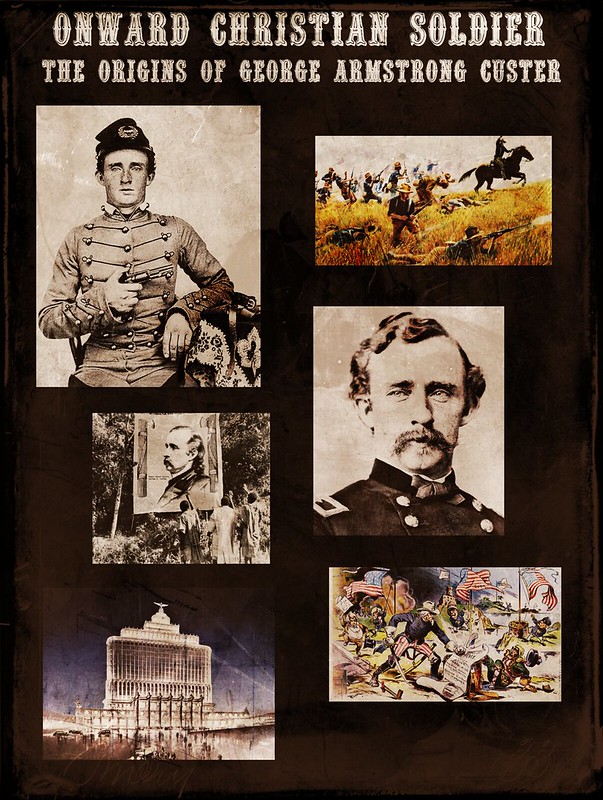
"There is no greater beauty than the American people. A people united by hardship, an unbreakable Union forged in blood and iron. A beautiful nation stretching from the Atlantic to the Pacific. I have seen the fields of grain. The cities of the East Coast. I have witnessed massive cattle drives in the West as steamships chug down their way down the Mississippi. When I think of what America means to me, what it means to you, and what it shall mean to our grandchildren... I can think of no greater or truer beauty. America is not just a nation. It is not just a political entity or union of regions. America is a breathing, living creature. She is the queen of realms, built on the blood of a million martyrs, and master of a destiny made manifest by our Creator."
- George Armstrong Custer, the Father of American Fascism
"As the Texan zouaves fired at us from behind their lines in the outskirts of Trinity City, we heard the screams of our men as our casualties mounted. We were breaking. We could not hold. And there stood General Custer like a stone wall. Gallant and strong, the flag in his strong hand whipping in the smoke-filled breeze. As we saw the Union standard being held up by that brave young yellow-haired Anglo-Saxon, we rallied. We reloaded our rifles and took aim, decimating the Georgians. As we pushed forward across that bloody, shell-pocked field, we cheered behind Custer and his flag. He led the charge with no weapon of war, only that beautiful banner. We won that day and Texas was put to ruin."
- Private William McKinley, 5th Ohio Infantry
George Armstrong Custer was born in the Ohio capital of Cincinnati on December 5, 1839, to Emmanuel Henry Custer and his second wife Marie Kirkpatrick. His brother Thomas would be born in 1845 and his brother Boston in 1848, with his sister Margaret being born in 1852. It was a large family, and he had several other half-siblings. Emmanuel was a blacksmith who had been a child during the War of 1812 and had grown up in the shell of post-War America poor and hungry. He later served in the Subjugation of Vermont. Shortly before George's birth, he abandoned his blacksmithing career, packed up his family from their home in the countryside, and moved to Cincinnati to work as a foreman on Colonel Goodyear Rail's new railway lines running out west.
George was a notoriously tough child and had an incredible tolerance for pain. While getting a tooth removed as a child, the dentist accidentally crushed the tooth with his pliers and had to drill deep into the stump to pull it out. He didn't complain at all, or even flinch. As he walked home with his dad, his mouth swollen and bloody, Emmanuel told him, "Son, you are going to make a hell of a man." Young George looked up at him and said, "Pa, you and me are gonna whip every Papist from here to Iowai."
This religious fervor was drilled into him by his deeply religious mother, who named him after famed Ohio preacher George Armstrong (who later served on the Council of Jehovah with Jesse Appleton). She had a strong desire to see the boy join the clergy, hence the name. George would go on to other things, however, and forever place himself in the annals of time.
With Emmanuel now working for Goodyear, his children could now afford to go to school (which was not free in Ohio at the time) and George quickly became an avid reader, enjoying Shakespeare, John Bunyan, and of course the writings of the Prophet Burr. In 1847, the Custer family was officially baptized into the American Fundamentalist Christian Church at a revival hosted by Reverend-Colonel Edward Everett himself. George was personally baptized by Everett, a moment that seemed insignificant to Everett at the time, no doubt, but which made a lasting impression upon 8 year-old George.
"It was as if a fire shot through me. I realized that Christ died for me and all men, and that by believing in him I would be eternally protected and under his care. I believed! When I held that snake over my head as I stood waist-deep in the sweet water of Manifest Destiny, and the Holy Spirit moved my soul, I knew, even as a child, that I would spend the rest of my life in service to my God and my Country."
-George Armstrong Custer
-George Armstrong Custer
In 1853, at the tender age of 14, George was built like a brick wall and could beat up children twice his size, even grown men. A mishap at a snake-handling revival in 1852 left him with a left index finger that he could never straighten out fully, but he made up for his disfigurement with flowing blonde hair and eyes that stood out in any crowd. It was in 1854 that Custer left home for work on the railroad. Goodyear Rail was expanding their trains out west into the Dakotas and the ultra-capitalist tycoon hoped to create the first transcontinental railroad ever, linking Philadelphia with Oregon. As Commander A. A. Lincoln swept into power in the East with the Second Sons of Liberty and as Napoleon II declared war on the Ottoman Empire, Custer was headed west into Indian country. As he crossed the Mississippi, a young man from Ohio looked off the side of the ferry carrying him across the river.
Things were going well for Custer until he was accused of murdering another railroad worker after a game of dice gone wrong in late 1854. For his alleged crime, he was fired and exiled out to the Redemption Territory, where he got a job for Old Kinderhook running telegraph wires and fighting local Indian tribes. Custer, at the young age of 18 in 1857, had already become known as the one of the bloodiest and most successful Indian-killers in the West. In 1858, Custer redeemed himself and became the town sheriff of Goldwater, Redemption and was soon one of the most influential young men in the territory. Next, he lived through the statehood of Redemption in late 1859. As Lincoln battled Georgia, Texas, and Virginia, Custer became the youngest ever State Marshal in Union history.

A young Marshal Custer
Killing outlaws was not enough for the young upstart, however. Despite his youth, Custer managed to drum up volunteers to fight from all across the state with General William Wheeler and found himself as second in command of the Volunteer Forces of Redemption. Wheeler and Custer led some 12,000 men on a voluntary basis across the plains to assault northern Texas. He proved himself time and again in vicious hand-to-hand combat. As word spread of his victories, the Union government elected to have the 3rd Ohio Battalion, under General Mitch Miles (third cousin of Reverend Milo Miles) join forces with the Redemption Volunteers and try to assault Trinity City, Texas's capital located along the Trinity River. There, Custer and Miles laid siege to the city, which would go on for several months. This was one of the worst campaigns for the Union during the war, judging by loss of high-ranking officers. Both Wheeler and Miles were killed in action by ambush on October 1, 1860. Custer, only a young man barely past his teens, somehow rallied his men and they made a final assault in just a couple weeks. On October 19, 1860, the capital of Texas fell. Custer, now acting general, was among the first men to charge through a gap made in the city's walls. Some called him the American Napoleon, but others called him Stonewall Custer for his complete lack of self-protection and tendency to jump into the deadliest thick of the battle. This nickname likely arose from a quote attributed to William McKinley of the 5th Ohio Infantry. As Texas reeled from the assault, its government fled to the recently booming city of Atlanta. General Miles assumed military control of Texas, but it was the young Custer and his "Rascals from Redemption" that won the praise of a thankful nation. President Lincoln personally summoned Custer to Philadelphia. There, he made Custer the youngest-ever Legate General of the Republican Legions and put him in charge of Legion XII out of Toledo and an all-out assault into Westsylvania, the last bastion of Virginian holdouts under their famed General Thomas Jackson following Robert E. Lee's surrender in the east at Petersburg Courthouse.
The Westslyvania Campaign saw the "Yellow Fox" clash again and again with Jackson and the "Free Army of Westsylvania." The rugged terrain and mountains made the war a tough one, but finally Jackson's luck ran out at the Battle of Beckley, when he was fatally and accidentally struck by his own men. Most of the Free Army surrendered following his death and Custer was proclaimed military dictator of the region. This all occurred before he had reached the age of 22. The man was proclaimed the "God of War" by Legate General Sherman, who said "This young pup from Redemption has more pluck and vigor in him than the entirety of the government back in Philadelphia."

Custer leads his men against Virginian forces in Westsylvania
Custer returned to Redemption in 1875 as newly-appointed Grand Marshal of the Union Army of the West to stamp out one last Indian revolt. The government now had some freed up funds to end the Indian wars once and for all. This final campaign was marked by his last devastating victory at Little Bighorn against the "United Confederacy of Free Tribes." The Free Tribes were considered too powerful for just Custer's Company alone, which was stretched thin by a recent insurrection at Wounded Knee, and so the Union Army of the West was sent in to break the Natives once and for all. The battle was largely decided by Custer's use of new Colonel Pierce Munitions "coffee grinder" machine guns, which mowed down the Native warriors like wheat under a scythe. This was the last time Custer was brought up into active service by the US Military. This battle was followed by the Rape of Redemption, an infamous event where the villages of the Free Tribes involved in the war were burned to the ground and thousands of innocents murdered by Custer's order. The Age of the Indian was over. The Anglo-Saxon-Teutonic marched on.
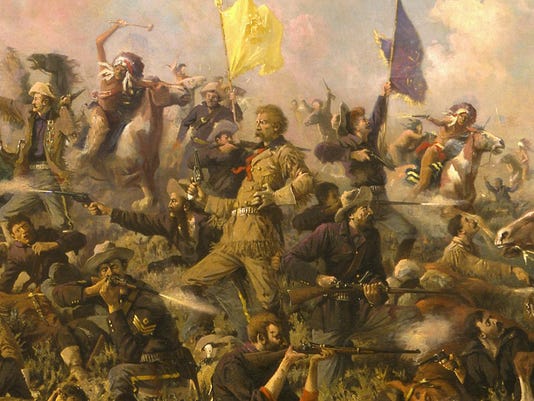
Custer crushing the United Confederacy of Free Tribes at Little Bighorn, Redemption
This became known as the War of the West and saw Custer decimate whole populations as he forced them to bend to his iron will as he worked his way to the Pacific. After Little Big Horn, there was simply no stopping his bloody progress. Slowly but surely, by 1878, his mission was complete, and the Native population in the Union dwindled to almost nothing. By 1879, he was leisurely using coffee grinders mounted on wagons to wipe out entire herds of buffalo, meeting the demand for their hides back east. By 1880, most all tribes had been relocated at the point of a bayonet, and many Indian treasures and artifacts were taken as spoils of war by the Company. They became coveted trophies collected by the Union upper-class and earned Custer an absolute fortune. By the 1880s, he was was ready to use his ill-gotten fortune to build his own new version of the Second Sons. Once again, a path was being laid through history for the creation of the Manifest Destiny Party...
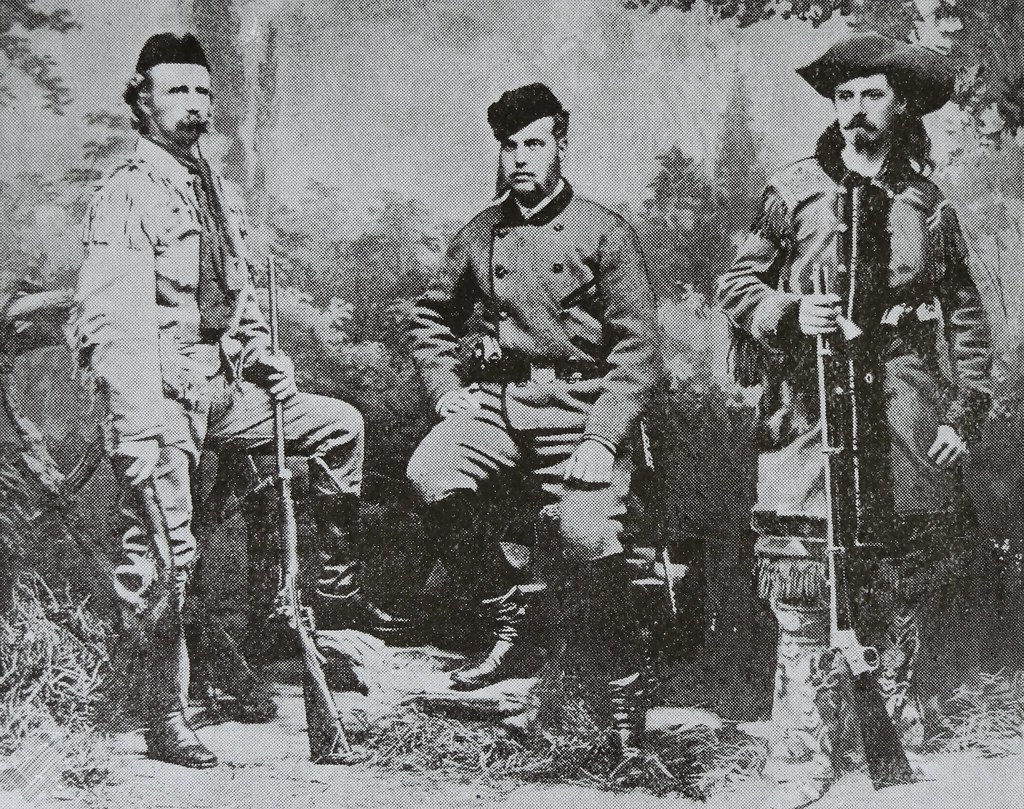
Custer and his brothers pose for a photo circa 1885
Last edited:
Yep, Wirz is this TL's Nathan Bedford Forrest. And somehow even Forrest seems like a kitten compared to this guy. This guy is going to be one of the most effed up characters in this TL.
On a scale from Joey Gobells to Charles Oswald in the Great Crash ending, how mad is Wirz?
On a scale from Joey Gobells to Charles Oswald in the Great Crash ending, how mad is Wirz?
As mad as Oswald. Not only is he a sadist, but he openly and freely admits it. At least Oswald masked his psychotic tendencies with patriotism. Wirz just loves to hate and loves killing even more.
He also was now aware of Wirz's war crime at the Hotel Bourbon.
War crimes weren't a thing until the second world war, so it doesn't make sense to include it hereWar crimes weren't a thing until the second world war, so it doesn't make sense to include it here
Yes they were. The actual Henry Wirz was convicted of war crimes OTL, or "for committing acts in violation of the laws and customs of war." He was the commander of Andersonville Prison, where my own great-great grandfather, a Union infatryman, died of starvation. Wirz was hanged in 1865. May he rot in hell.
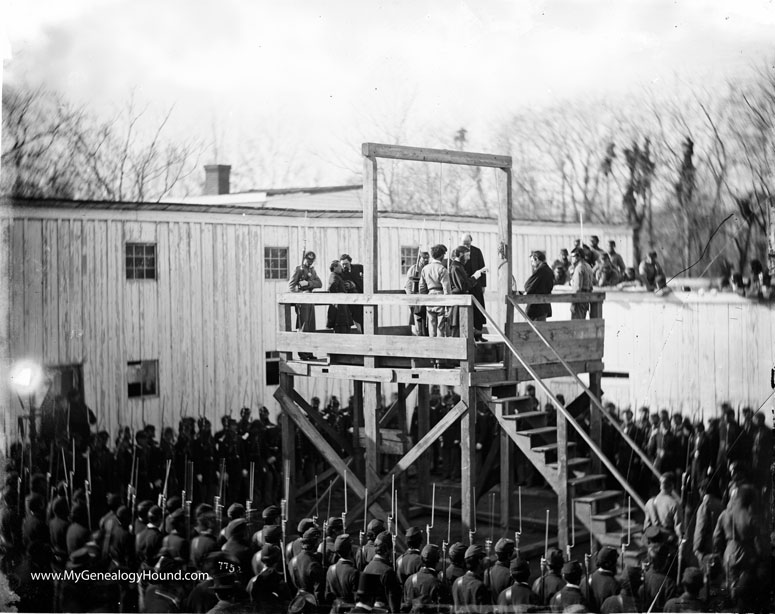
CHAPTER 36
CHAPTER 36
THE RESTORATION
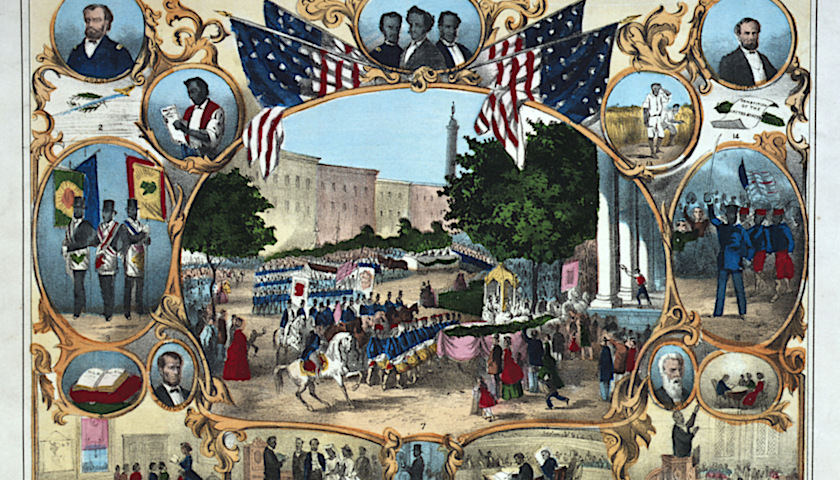
THE RESTORATION

The winter of 1859-60 was even worse than that of 1858, with a massive amount of snow and ice all across North America. This was exactly what Robert E. Lee, General of the Army of Northern Virginia and acting Potentate desired. His men were now well dug in at Petersburg, just south of Richmond. He had narrowly escaped being squeezed between Jenkins and Sherman and had no desire to let his position be compromised again. He had a decent trench system running around and through the city by the time the worst of winter came and the Union Army ground to a halt. Richmond was in shambles, and even the Union was reluctant to endorse some of the savagery the revolting blacks had committed to their former masters. Reverend Douglass showed up to try to contain the situation, but it was too late. Most of the Virginian government had been captured by the slaves and murdered, some having their throats slit by their servants in their sleep. This ghastly affair was simply a horror show all around. Now, the local whites had struck back, massacring several hundred black revolutionaries. At last, Sherman and Jenkins arrived in early November and restored order to Richmond. They had none of it, and immediately declared military rule and disarmed many of the black mobs. Reverend Douglass begged his people to instead actually join the Union Army rather than butcher innocents in the streets. This many of the former slaves did. There were still some radicals who desired to create a Beutelist "Commune of Richmond." This would not do. In order to maintain the black race's good graces, Sherman ordered his negro soldiers to hunt down and destroy the leadership of the Commune, declaring, "I won't have no damned Beutelist leftists in the midst of America butchering at random and seeking to establish general anarchy."
Following the destruction of the Commune, Jenkins and Sherman took up residence in the old Virginian House of Burgesses for the winter, as the freezing cold set in. Meanwhile, just a few miles South Lee was drafting his first proposals for his surrender terms. His formerly thick, jet black hair and mustache was now giving way to baldness and a gray beard. The brutality of the war was really taking a tole on him, and it showed quite visibly. He was a kind man by nature, and only was serving out of duty to his fatherland. As he sat there pondering, 1860 had dawned, and with it a new year of bloodshed and slaughter.
To the immediate south, Jubal Early appeared once more. Long thought dead, Early was captured near Williamsburg by Carolinian patrols. He was attempting to escape by boat to Europe, and had supposedly been offered asylum in Greenland. He now begged the Confederation for mercy. According to him, his family had been killed by revolting slaves during the outbreak of revolution in Richmond and he had been hunted like a wounded bear since then, black riders and hounds chasing him for months. He had spent the last few months at an isolated cabin, but the blacks had located him once more. That was when he had attempted to flee to Greenland. The Confederation, hateful toward anything Virginian but also going through their own slave revolt took him in, in a sort of gentle house arrest in Raleigh. However, in a shocking turn of events, a mob of angry citizens found out where he was being held, stormed through the guards and killed him with knives and sticks, screaming "Justice for Ol' Hickory!" Revenge was complete, and the death of Andrew Jackson was avenged. Lee couldn't believe the news when he heard it and it outraged him that the Confederation didn't do more to protect him from their own citizens. Many whispered that the Confederation had actually let the attack happen and wanted him to die, they just didn't have the guts to hang him for no reason other than being Potentate of Virginia. At any rate, any soldiers who were questioning Lee's legitimacy as Potentate were now placated, and Lee officially assumed absolute power over what little remained of the Republic of Virginia.
The war was about to take another fateful turn and "Burnin' Sherman" was about to be unleashed in February, 1860, despite the cold. A large force of Maryland volunteer militias had attempted to board civilian ships and run the Union blockade of the Virginian coast to assist Lee. Lincoln had had enough. Maryland, for so long a "neutral power" despite constantly running supplies and "volunteers" to Virginia, had to go. On January 24, 1860, President Lincoln declared war on the Chesapeake Republic of Maryland. Sherman took a sizable force from Richmond and marched north through the bitter weather and invaded Maryland. Sherman said of the invasion, "We shall warm ourselves on Maryland's funeral pyre." He was not lying. The entirety of the first Marylander town they came across, Germantown, was burned to the ground, its residents sent fleeing and its defenders butchered or taken prisoner. Maryland without Virginia was simply an easy target to steamroll, and their defeat was certain for the duration of the conflict. By early spring, Baltimore was under siege. Despite certain defeat, the scarlet-coated defenders held out valiantly until July. On July 3, Sherman stormed the city and captured the government. Then he burned down their government buildings and declared that the Chesapeake Republic was no more. After consulting with President Lincoln, a desire to "de-papify" the former nation led to the creation of the Union "State of Burrland," removing the "despotic namesake of the French papist wife of that ancient villain Charles I whom Cromwell did so righteously behead." This triggered a massive wave of new resistance in Maryland, which was exactly what Sherman had wanted. The renaming was simply a mindgame "to get the treacherous subversives to come out of the woodwork." Sherman then gleefully set about burning down 15 cities and towns which rejected Union rule. Finally, in September, Annapolis surrendered, ending the Union-Maryland War and beginning Sherman's occupation of the region.
Throughout the spring, Lee managed to just barely keep his men going and held off several advances by Jenkins. At last, on July 4, 1860, Robert E. Lee and his officer corps rode to the Union lines under a white flag of truce. He asked for the Union leadership to meet him at the Petersburg Courthouse to accept his terms of surrender. Elated, Jenkins gladly accepted and rode with his men to the place of meeting to hopefully start wrapping up the war. Lee was surprisingly demanding for a fellow in his position, asking that Virginia retain Columbiana and Westsylvania and admit fault for the war and pay reparations. This was simply not going to happen. Despite Lee's best attempt, the Union would stop at nothing short of total domination and manifest destiny.
"General Lee, I actually have a world of respect for you, as I am sure you are aware, but these terms will not be found satisfactory back in Philadelphia by neither President Lincoln or the National Assembly, and so I ask you to reconsider. Maybe there is some other universe or world out there where things are different, and there is still an independent Virginia, but in our real life, this... is simply untenable. I am sorry for all you sacrificed to be in vain, but the Republic of Virginia must join the Union for there to be real peace. We won't tolerate such an adversary building up once more to attack us twenty or thirty years from now. The cycle of violence on this continent must be ended. The Restoration is upon us. A Republican Union united as one from sea to shining sea, under our worthy President. I ask you to join us. In exchange for your total surrender, President Lincoln had instructed me to tell you that you, your staff, and every single one of the men in the Army of Virginia will be granted a full peace and be allowed to return to your farms and homes and families. No homes or farms will be burned and no hangings will be allowed for anyone except those convicted of the foulest war crime. This is a very generous offer, and we ask you to consider it seriously."
- Field Marshal Wyatt Jenkins, Petersburg Courthouse, July 4, 1860
After several hours of consultation with his staff, Lee signed the Treaty of Petersburg Courthouse, surrendering Virginian sovereignty to the Republican Union and officially bringing Columbiana and Westsylvania into the Union as the State of Virginia and the State of Westsylvania. However, General Thomas Jackson, commander of Virginian forces in Westsylvania, refused to acknowledge the surrender and created the "Free Army of Westsylvania to continue the war. Styling himself as "Potentate-in-Exile," Jackson would hold out for a while in the mountains, squirreling away supplies and fending off Union patrols.

Potentate Lee surrenders the Republic of Virginian sovereignty to Field Marshal Wyatt Jenkins at Petersburg Courthouse
On the other side of the country just three months later, a young acting-general George Custer had just conquered Trinity City, capital of the Democratic Republic of Texas. On October 30, 1860, Texas formally surrendered to the Union, with Lincoln and the National Assembly quickly passing legislation to make it a state (albeit under martial law). Now, he was shipped to the east coast to receive the acclaim of President Lincoln in Philadelphia and to take command of Legion XII, based out of Toledo, Ohio, in an effort to capture or kill Jackson in Westsylvania.
Georgia, meanwhile, was all sorts of a disaster. Prime Minister Towns was barely holding the country together while Prince Alfonso, now his chief of staff, struggled to restrain the negro population while still fending off incursions from McClellan. Mississippi and Fort Davis had fallen in the spring, with the Bahamas shortly after in the early summer, leaving just the Departments of Bulloch, West Florida, Peachtree, Savannah, and Florida as the last remnants of a once fledgling empire. All through 1860, Georgia made a good go of things, trying their hardest to strike back in nighttime raids and utilizing guerrilla tactics to make the most of their now quickly-depleting manpower. With AFC spreading through the black population, however, it seemed just a matter of time before the final fall. That final collapse would come that winter, when McClellan and Legion X would utilize that year's more tolerable weather to strike hard and fast through Georgia, taking Elyton and Mobile as Marines from the Caribbean overwhelmed southern Florida. With the hostile Confederation to the north and surrounded by Yankees and seawater, Towns had to start making some very tough decisions.
Towns was firmly aware that he was held responsible for the sinking of the O.K. Sultan and was considered a war criminal by Philadelphia. As such, he held out until news came in early November of Texas' fall. This was the last bridge to burn. Towns stealthily left the capital with Prince Alfonso and his staff on a sloop and managed to dodge Union patrols, eventually landing in Central America. The abdication of Prime Minister Towns and his staff left Georgia to General Henry DeLamar Clayton to run. For two more months, Georgia fought on, but eventually Clayton surrendered to McClellan on January 10, 1861. With the exception of Westsylvania, the continent was now at peace.
In March, 1861, a series of deadly skirmishes with Custer left Jackson on the run. His luck finally ran out near Beckley, where a nighttime ride left him victim to his own troops' bullets. Jackson was dead, and with him died independent Virginia and the Free Army. One week after his death, Virginians all over Westsylvania started laying down their arms. March 12, 1861, was from that point on remembered as the "Day of the Great Peace."
Celebrations erupted across the Union, from Boston to Oregon, with millions of citizens thankful the war was finally over and the Old Republic's borders had been restored. The Carolinas had to pledge to eradicate slavery by 1870 or Lincoln "could not guarantee their continued existence." This left the Confederation little more than a satellite of the Union. Lincoln was practically deified, as he doubled the size of the Union and fulfilled every single campaign promise he had ever made, plus he had seized the entire Caribbean. It was with great joy and jubilation on July 4, 1861, that the President announced that the Old Republic Stars and Stripes, the battle flag of the Union during the war, was now replacing the banner of the Republican Union as the national flag.
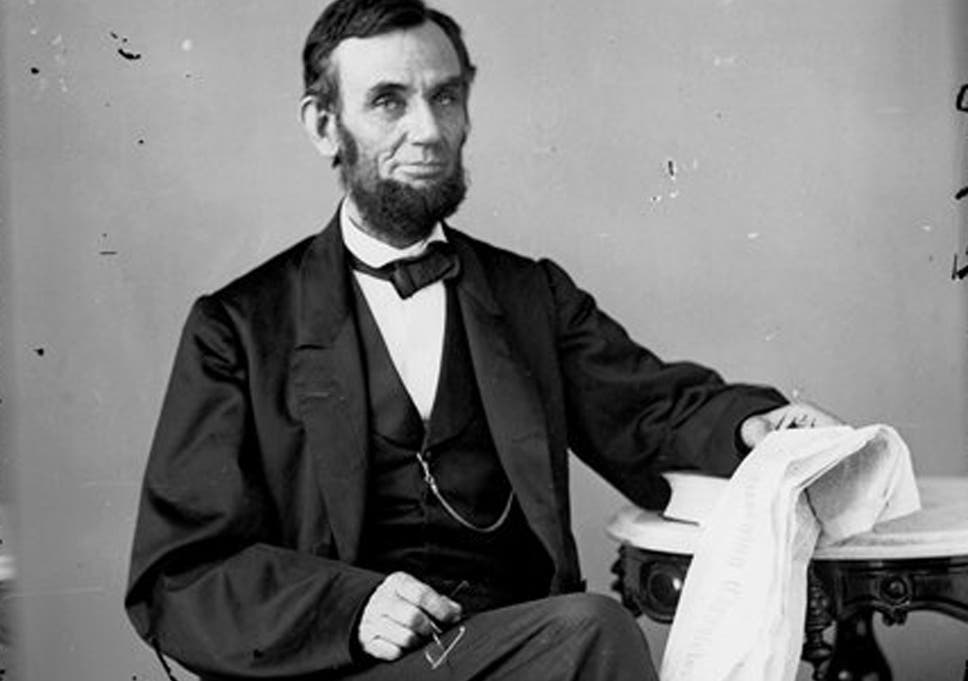
"Words cannot express how grateful and thankful this nation is to the Armed Forces of the Union. This nation, now united in brotherhood and loyalty to the same God-ordained government for the first time in almost four score years. Four score and five years ago, our forefathers brought forth on this continent a new nation, conceived in the idea that unity brings strength and that we are all subject to God's laws and standards. United, our forefathers cast out the Mad King. However, when the dark days came and the fall of the Old Republic, our forefathers showed that treason and subversion can fracture a nation and disintegrate it from the inside out. Though we hanged the traitors Adams and Hamilton, the damage was done. Some years later our great people would experience the Great Betrayal, as our Southron and French 'allies' left us high and dry during the War of 1812. From that day onward, we all swore an oath to Jehovah we would one day right these wrongs and bring God's righteous fury upon these traitors. Then came the Prophet Burr to show us the Way, the Truth, and the Light. Then came the titans of industry. We rebuilt our pitiful nation. We showed the world that America can never be destroyed. And today, as we celebrate the Restoration, we show the world that the Union shall stand 10,000 years, indivisible, with liberty and justice for all who respect our values upon which we build our country. This eternal Union is the New Jerusalem that the Prophet did speak of in the Holy Books of Manifest Destiny. We have walked one giant step closer to building this New Jerusalem. One day, maybe soon or maybe after decades or even a century, we will see our destiny realized and the New United States shall be born. But let us rejoice today! For we have earned a great victory, and the traitor states of the Old Republic, for over six decades in the hands of criminals, slavers, and liars, have been restored to the fold! Hallelujah!"
- President A. A. Lincoln, July 4, 1861
- President A. A. Lincoln, July 4, 1861
/https://public-media.smithsonianmag.com/filer/95/73/957358af-b319-4c4f-8e91-c1d87656085a/02829v.jpg)
The 20th Chersonesus parades through Philadelphia on Restoration Day, 1861
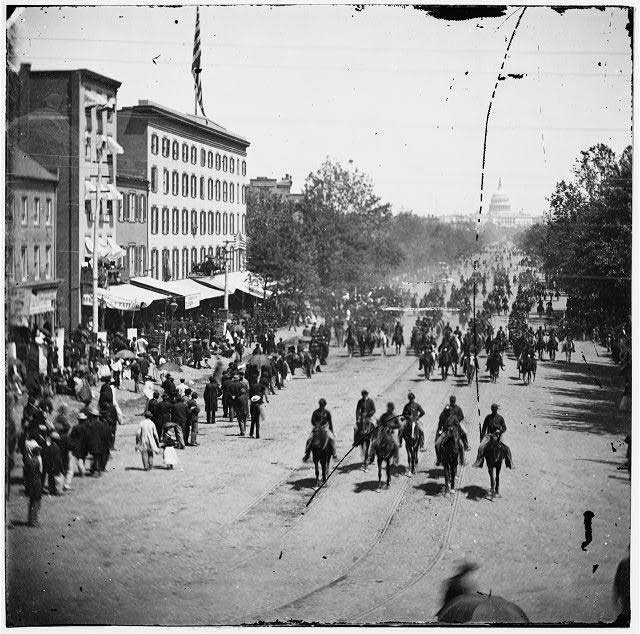
Men of the 10th Pennsylvania Light Dragoons trot past jubilant crowds shortly after

Negro soldiers pose for a photo in Richmond, Restoration Day, 1861

Field Marshal Jenkins parades the new National Flag before his men on Restoration Day, 1861, deep in occupied Virginia
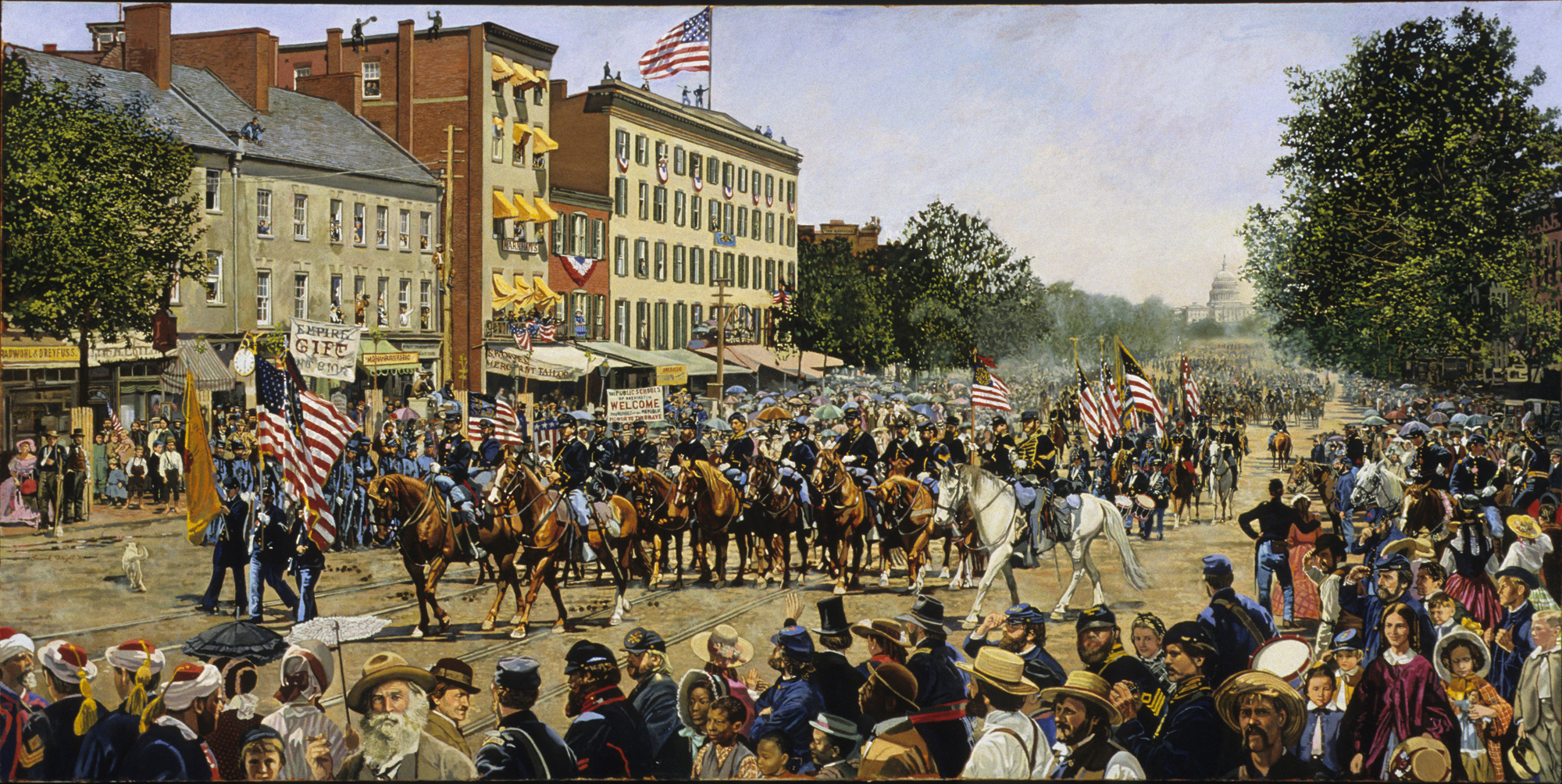
A painting of Restoration Day, 1861, on Philadelphia's main thoroughfare

Postcard commemorating the Restoration

Cartoon depicting Jenkins bringing peace between whites and blacks in Virginia

Celebration of Emancipation

Soldiers of the 23rd Massachusetts Regiment of Foot display a battle flag they carried through the entire war
Unfortunately, the celebrations couldn't mask the deep sorrow felt by millions of families as their sons' bodies came home in boxes. The final real death toll of the war might never be truly known, but the estimate is somewhere around two million. Many of the deaths were civilian, and countless cities were utterly destroyed by both sides. The fighting had scared thousands of men deep in their souls, forever linking memories of the Great American War with nightmarish thoughts of severed limbs and fallen comrades.
Postcard commemorating the Restoration

Cartoon depicting Jenkins bringing peace between whites and blacks in Virginia

Celebration of Emancipation

Soldiers of the 23rd Massachusetts Regiment of Foot display a battle flag they carried through the entire war
The Southrons were not finished yet, however. Instead, some would say they actually had the last laugh of the war. On September 5, 1861, while visiting occupied Savannah, President Lincoln's carriage was hit by a bomb, killing him instantly and wounding his wife. Immediately, the "Riders of the Storm," a terrorist outlaw group led by Heinrich Wirz, proclaimed responsibility for the attack. The nation was shook to its core as the one man who put it all together suddenly was gone. One day he was President of a victorious reunited America, and the next he was a patriot-saint and martyr. The Strong Man was dead. Vice President Hamilton Fish was sworn into office immediately, but he was stepping into some very big shoes. And now he had to deal with a terrorist insurrection, rebuilding and de-Inferiorizing the South, and a new movement that would sweep the country known as Spiritual Marxism....
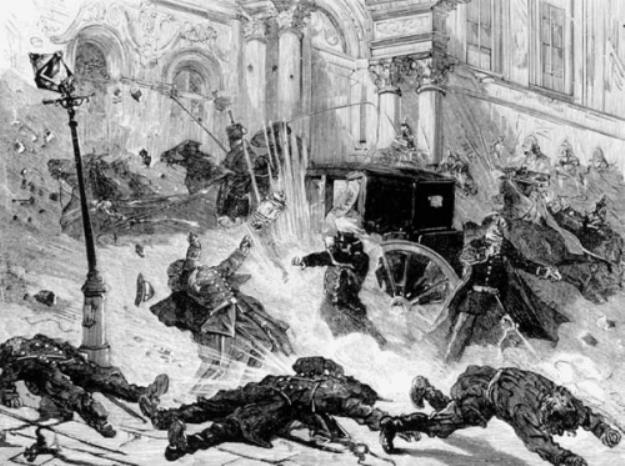
Assassination of President Lincoln by Southron terrorists
President Hamilton Fish
Last edited:
I fear this isn't the last time we'll hear from Mr Wirz. Something tells me we'll see him again soon.
Well, you learn something new every dayYes they were. The actual Henry Wirz was convicted of war crimes OTL, or "for committing acts in violation of the laws and customs of war."
Last edited:
AeroTheZealousOne
Monthly Donor
On September 5, 1861, while visiting occupied Savannah, President Lincoln's carriage was hit by a bomb, killing him instantly and wounding his wife. Immediately, the "Riders of the Storm," a terrorist outlaw group led by Heinrich Wirz, proclaimed responsibility for the attack.
It appears Lincoln still dies in similar circumstances to his real-life counterpart: Victorious in a war in the Americas, killed by a rather perturbed (to say the least) Southerner.
Come on, why can't the Beutelists have their assassination attempts go right? Lucky Southrons. I mean, it wouldn't doom the world that badly, would it? Right?
The defeat of Virginia and Georgia I expected, but not total annexation! I thought they’d at least survive as long as their original counterparts.
RIP Maryland, you will be missed.
With the South down for the count, maybe the RUs next challenge in the continent can come from Brazil. A powerful catholic mixed-raced empire would cause the AFC to have a conniption
And the Carolina, too, is all but destined to be an absolute clusterfuck.
The defeat of Virginia and Georgia I expected, but not total annexation! I thought they’d at least survive as long as their original counterparts.
RIP Maryland, you will be missed.
With the South down for the count, maybe the RUs next challenge in the continent can come from Brazil. A powerful catholic mixed-raced empire would cause the AFC to have a conniption
As far as this war is concerned, a particular quote comes to mind: "It was not war, but murder."
Madness indeed.
Madness indeed.
Wait, so is the Vulture still independent?
It sounds like if you use a somewhat loose definition of independent, then yes. They can theoretically do what they want, but in reality have to toe the Yankee line.
The Carolinas had to pledge to eradicate slavery by 1870 or Lincoln "could not guarantee their continued existence." This left the Confederation little more than a satellite of the Union.
I assure you, my fellow Carolinians, that our great nation is not a "puppet" or "satellite" of our Great Northern Allies! We are merely united in common interests of Christian government and continued freedom!
Abe! Not Abe! Truly a pity he could not see the fruits of the Union's great victory.
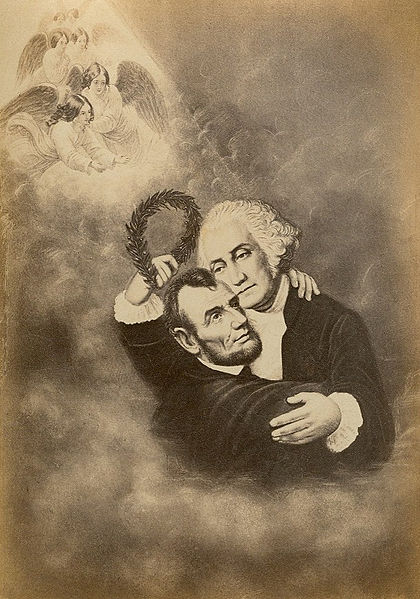
But I am kinda of surprise at the North annexing just about everything, but the Carolinas. Now you only have California, Mexico and Freach Canada to worry about.
Onward to the Caribbean! (And fun times in the Wild West.)
I wounder where dear Prince Alfonso had gone off to now...

But I am kinda of surprise at the North annexing just about everything, but the Carolinas. Now you only have California, Mexico and Freach Canada to worry about.
Onward to the Caribbean! (And fun times in the Wild West.)
I wounder where dear Prince Alfonso had gone off to now...
Threadmarks
View all 142 threadmarks
Reader mode
Reader mode
Recent threadmarks
THE 2019 MADNESSVERSE HOLIDAY SPECIAL: "IT'S PATRIOT-SAINTS DAY, ZAP ZEPHYR!" THE BIGGEST HOSTAGE OF ALL "THE WHOLE WORLD HEARS YOU!" OSWALD: AUTHOR OF HIS OWN DESTINY THE GREAT EUROPEAN SCHISM: RISE OF THE NEW HOLY ROMAN EMPIRE IN A "SAFE" PLACE THE SUMMER OF '37: THE OLD HOMESTEAD ROUNDERS: THE WORLD SPORT
Share: